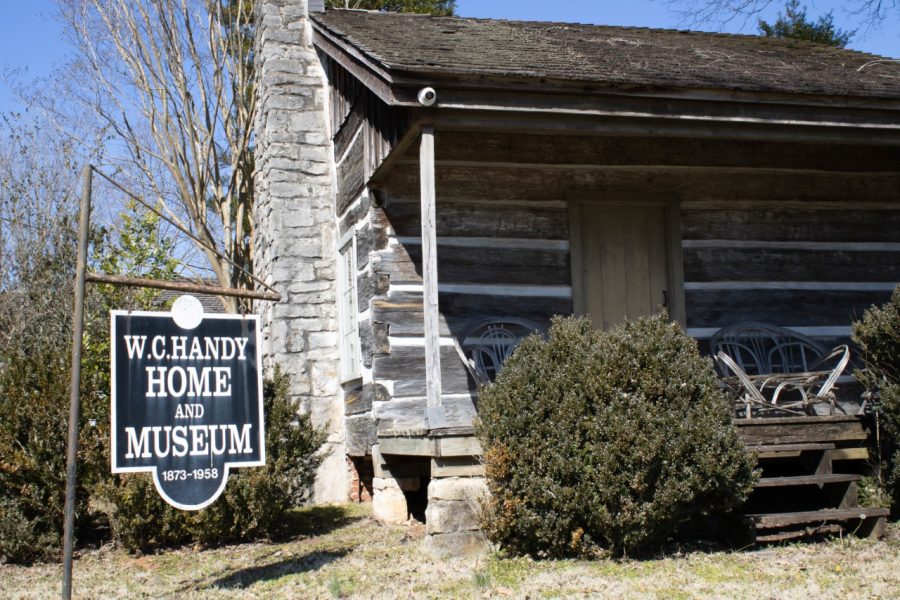W.C. Handy’s cities of the blues
February 26, 2022
William Christopher Handy, Father of the Blues, was born on what is now known as College Street in 1873. The small log cabin was built by his grandfather, with whom he shared a first name. Handy grew up as an apprentice of carpentry, shoe making and plastering. However, his true love was music. In his 1941 autobiography (titled “Father of the Blues”), he credited Florence for its musical abilities. From its lush flora and fauna to the melodic rhythm of Cypress Creek, Handy saw a musical quality in Florence.
His childhood home has since been turned into a museum in devotion to Handy. Prior to his death in 1958, he donated personal papers which included some handwritten original music pieces. His hometown clearly was important to him and Florence equally loves him back. The W.C. Handy Music Festival was created in 1982 with the intent to preserve and promote Florence’s musical roots (and who better to title it after than Florence’s most musical resident?). Wilson Park also erected a statue in memoriam of Handy.
“Where the Tennessee River, like a silver snake, winds her way through the clay hills of Alabama, sits high on these hills, my hometown,
Florence,” Handy said in his autobiography.
As he grew up, Handy sang in church. This origin would shine through in his later secular music. His father was vehemently against musical instruments in the home and ordered for his son to do away with the guitar he had secretly purchased. He continued pursuing music in secret, even joining a band and buying a cornet off of a fellow band member.
Handy’s musicality did not waver as he grew. He began working on a “shovel brigade” at the McNabb furnace. There, he used his shovel to create music with his fellow workers to make the long days go by easier. He later said that the practice was a formative artistic moment for him. His move to Birmingham and Bessemer in 1892 marked the beginning of a true career. In his free time from work, he formed the Lauzetta Quartet. His Chicago World’s Fair dreams were squashed after it was postponed, but the following year he played cornet at the fair and various other shows in years after. At the age of 23, he became bandmaster of one of the shows.
In the late 1890s, Handy met his wife and settled down in Florence, where their first of six children would be born in 1900. He eventually began traveling again two years later and made his way around Mississippi. While there, he heard many styles of African American music and began developing his own style.
Handy moved to Memphis, Tenn. in 1909 with his band. He began playing on the iconic Beale Street (though at the time it was not as well known) and created his first hit “The Memphis Blues”. It was originally written for a Democratic mayoral candidate and was titled “Mr. Crump” but it grew in popularity so much that Handy changed the name to “The Memphis Blues”. Handy began employing Black folk into his musical style, following the same harmonic structure and key. Nowadays, they are referred to as blues notes. The publication of his works was revolutionary due to his status as a Black man.
One of his most famous works, “Beale Street Blues”, was pivotal in the popularity of the street. His home on the street is now a museum, much like its Florence counterpart. The street is now the largest tourist attraction in the city, and Elaine Turner, director of the Memphis museum, credits that to Handy.
“W.C. Handy has had a tremendous effect on not only African American music,” Turner said, “but music genres all over the world.” Beale Street has always been a cultural hub for the Black community, but it was also a refuge during Handy’s time. Handy made it his own and took Memphis by storm. The city was where he first documented the blues, giving it a newfound prominence and notoriety that it did not have before. All of it was done on Beale Street — Handy even influenced the name to be changed from Avenue to Street.
“Beale Street was a safe haven where [African Americans] could have their businesses,” Turner said. She also stated that it was the main street for the community. Beale Street continued to be iconic in Black culture. Many songs, books and newspapers were created and housed on the street.
Like Florence, Memphis also created a statue in honor of Handy. According to Turner, it was the first statue of a Black man to be erected in the city.
These two cities, Florence and Memphis, have a little-known but undeniable connection. The blues runs deep in the cities’ veins, and it is all due to W.C. Handy. Most Florence natives have heard his name but may not know the strong influence he had on the entire world. Even
today, Handy continues to be an influence and role model for people in the African American community.




